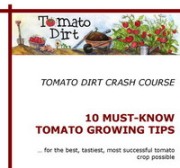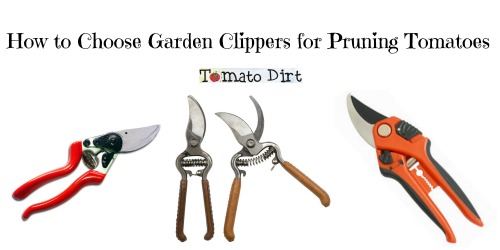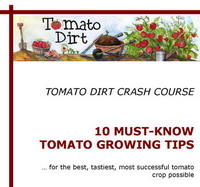FREE: 10 Must-Know Tomato Growing Tips Get The Guide
Read our affiliate disclosure here.
How To Choose Garden Clippers for Pruning Tomatoes
Since 2010, Tomato Dirt has garnered 4.8+ million views, making it the web’s leading online source for growing tomatoes in the home garden. Award-winning writer and Tomato Dirt owner Kathy Widenhouse has helped thousands of home gardeners grow healthier tomatoes. Be one of them when you get Tomato Dirt’s Growing Guide here.
A good set of garden clippers are one of a gardener’s best friends. You use them to prune tomatoes, trim away damaged foliage, and even harvest tomatoes, especially those that are on thick stems. Plus, when you choose a versatile set of clippers, you can use them in when taking care of other vegetables, flowers, and plants too.
When it comes to choosing cutting tools, you have many options. Here’s the dirt.
Kinds of Garden Cutting Tools
Garden clippers are a member of large family of garden tools that have the job of cutting. They can be divided into four large categories.
1. Pruners (aka clippers): smaller hand-held tool with two short blades, designed to trim or prune garden flowers and plants. They are sometimes called secateurs. Pruners operate with one hand and include bypass pruners, anvil pruners, and even garden scissors. A spring re-opens the blades after each cut. Pruners don’t generally cut anything that’s bigger than ¾ - 1 inch in diameter – most often ½ inch wide. Anything larger requires a lopper.
2. Loppers: this tool has a pruner mechanism and longer handles. You operate them with two hands for extra leverage. Loppers are used to trim and prune larger plants, bushes, and trees.
3. Garden Saws: a single-blade tool, often long, thin, serrated, and made of steel. Saws operate using a backward and forward movement. Use them to cut larger branches or hand-to-reach areas.
4. Garden Shears: this cutting tool is like pruners in that it has two blades, but shear blades are longer longer. Shears are most often used for trimming grass or plants that surround structures like sidewalks and fence posts. Garden shears also differ from pruners in that they operate best with two hands rather than one.
A pruner – aka garden clippers – is your best cutting tool choice for pruning tomatoes. Pruners are hand-held cutting tool, which makes them handy and manageable when working your way into thick tomato plants to cut individual tomato stems. The pruner’s mechanism is the right size for tomato branches, too, which rarely exceed 1-inch in diameter.
(Check out a good selection of garden clippers here.)
Types of Garden Clippers
There are three types of pruners/clippers to choose from.
- Bypass Pruners: these have two curved blades that move pass each other (“bypass each other”), operating like a scissors. One blade is sharp. The other is thicker and unsharpened. Of the three types of clippers, bypass pruners make the cleanest cuts and are easiest to use. They are recommended for living stems.
- Anvil Pruners: these have a one straight blade that cuts as it closes onto a flat edge (the “anvil”), operating like a knife on a cutting board. They are bulky, which makes them difficult to maneuver in tight areas like tomato plants. Anvil pruners are best used on dead wood rather than live stems since they easily crush soft stems as they cut.
- Ratchet Pruners: a type of anvil pruner, ratchet pruners have an extra mechanism that allows you to cut in steps, which is especially helpful for those with weaker wrists.
Tomato Dirt recommendation for pruning tomatoes: bypass pruners. Of the three types of pruners/clippers, they are best for live stems and for maneuvering in tight spaces in between branches. (Here are some clippers to check out.)
Other Considerations When Selecting Garden Clippers
Latch: make sure the clippers have a locking mechanism that secures the blades after cutting. This prevents injury and protects the blades. Study how to lock and unlock the clippers. Be sure to latch the blades after each use.
Material: clippers made of hardened or carbon steel cost more than other clippers, but they last longer.
Ergonomic design: choose these if you do a lot of gardening or if you have finger, hand, or wrist problems. Ergonomic pruners require less pressure to use. Look for specially-angled blades and soft-grip handles.
Left-handed clippers: available for southpaws!
Tomato Dirt Tip: Keep Your Clippers Clean and Sharp
Dirt, moisture, pollen, sap, and debris accumulate on your clippers during use. Your clippers will last longer if you clean them after pruning. You’ll also help prevent spreading tomato diseases if you keep your clippers clean. Wipe blades and body with a rag. Apply a light coat of lubricant such as WD-40 to the blades to keep rust at bay. Keep the blade sharp, either by periodically re-sharpening it with a knife sharpener or by replacing the blades. Store your garden clippers in a case to keep them safe and clean.
More about Pruning Tomato Plants
Pruning tomato plants: simple pruning and how to do it...
Pruning tomato plants: different methods to try ...
Tips for Topping a Tomato Plant to Extend Harvest ...
See more tomato pruning tips on our Pinterest board...
More helpful gardening tools
Watering gadgets: which ones do you need for growing tomatoes?
Return from How to Choose Garden Clippers for Pruning Tomato Plants to
Tomato Dirt home
As an Amazon Associate and Rakuten Advertising affiliate I earn from qualifying purchases.
SHARE THIS PAGE:
FREE! 10 Must-Know Tomato Growing Tips: 20-page guide
Get yours here:





New! Comments
Have your say about what you just read! Leave a comment in the box below.